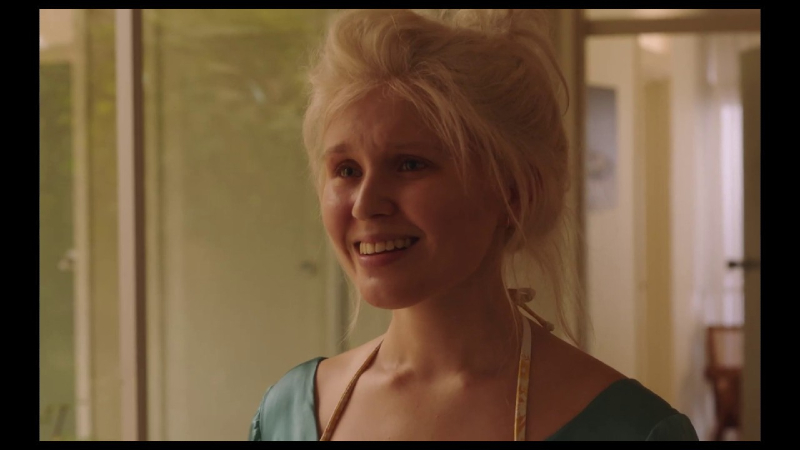Director – Shannon Murphy – 2019 – Australia – Cert. 15 – 118m
*****
In cinemas from Friday, August 14th and on BFI Player from Monday, December 7th
Uniformed schoolgirl Milla (Eliza Scanlen) stands on a platform ill at ease with her classmates. The train comes in. Before she can move to get on it, someone has knocked into her rushing past to stand close to the passing train. It’s Moses (Toby Wallace), unkempt in shorts and tee shirt. He asks her for money. He points out she has a nosebleed, cradles her on the ground, puts his tee over her mouth and jaw… to catch the blood.
Milla’s psychiatrist father Henry (Ben Mendelson) has a home session with a patient that turns into sex on a desk. This is his wife Anna (Essie Davis) who is on medication and has mental problems. They have another problem as a family: their daughter has cancer.

When Milla brings Moses into her parents’ comfortable suburban family home, they take an immediate dislike to him. This reaction is compounded by his habit of stealing medications from their home to sell later on the street. Nevertheless, he will be around the home more and more and by the end will be to all intents and purposes living there with Henry and Anna’s consent.
Films about people dying can so easily become mawkish and sentimental. This one admirably avoids that trap. Milla is written as a convincing flesh and blood teenager just at the age when she’s beginning to take an interest in members of the opposite sex who is at the same time burdened with the knowledge that she has a medical condition that as likely or not will kill her.

Early in the film she starts a course of chemo and has her hair shaved off, wearing a wig outside the home i.e. for going to school. Another girl asks to try it on in the school toilets and when Milla walks around in it at school her contemporaries reaction has about it the air of the freak show, not an element the film chooses to dwell upon. When Moses sees her enter a room in her home with her shaved head, however, his reaction is that he thinks she looks beautiful.
Trying to come to terms with her condition is forcing Milla to grow up fast, a situation compounded by the fact that her psychologically needy mother isn’t always able to give either her husband or her daughter the support they need – and knows that she isn’t. Eliza Scanlen’s winsome performance works as a deft balancing act as Milla walks the difficult tightrope between teenage child with her whole life ahead of her and human being knowing they face a long, drawn out and possibly agonising death fairly soon. We warm to her as a teenager, we identify with her mortality, we wince at some of the situations she puts those around her through.

The script divides the film up under a series of verbal headings. The Shower Routine, for instance, has mum complain to dad that there’s something wrong with the shower’s pressure when there isn’t, a clear act of attention-seeking.
Anna is a former orchestral pianist wracked with guilt about working when her daughter was small who has long since retired to become a housewife, pushing her daughter to play the violin while rarely touching the piano herself. Essie Davis’ extraordinary rendition here constantly shifts between responsible parent and needy individual, sometimes appearing normal and sometimes in desperate need of help and/or care. Which her psychiatrist husband gives, even though doing so sometimes threatens understandably to push him over the edge.

By way of contrast, Toby Wallace plays Moses as a wide-eyed innocent lacking in social skills who sometimes cuts through all the respectable niceties of the comfortable suburban lifestyle to get to the values that really matter. Milla is to some extent smothered by the safe environment of family life and finds Moses someone with whom she can talk to and feel things. Smothering is a strange word to use, since towards the end she asks him to literally smother her with a pillow, a request with which he doesn’t want to comply.
The film is effectively a four-hander structured around two dysfunctional couples, the parents and the teenager with a boyfriend with the emphasis most definitely on the teenage girl from whose point of view the film is constructed. Although it’s also true that there are scenes with the other three which take place outside her experience.

Underpinned by a strong script by Rita Kalnejais, director Murphy has both though both excellent casting and carefully feeling her way though blocking and shooting, brought a lightness and a freshness to material that could so easily have been little more than an exercise in emotional button pushing. A good film to help get us all back in to cinemas.
Babyteeth is out in cinemas in the UK on Friday, August 14th and on BFI Player from Monday, December 7th.
Trailer:
